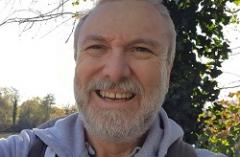You are here
- Home
- Our student stories
- Paul Mylrea
Paul Mylrea

Paul began his MBA in 2003 and graduated three years later with a Distinction and ‘MBA of the Year’ title under his belt. With an impressive career behind him, he is now due to retire and will be splitting his time between working as a consultant on projects that are important to him and working as a Magistrate in court.
“I did my MBA because I’d moved from a role as a Foreign Correspondent for Reuters to a new position running a charity start-up funded by Reuters. I suddenly thought ‘Oh my goodness, I’m not a journalist anymore!’ and realised I needed to understand how to run a business and manage this complex environment I was facing.
“During my studies, I began managing PR teams in the charity and public sector. Over the years, I have worked for Oxfam, Transport for London, Save the Children, the BBC, and the UK Government’s Aid Department.
“If I’d moved from being a correspondent to managing PR teams without the OU, I’d have been a bit lost trying to work it all out. But the MBA gave me the confidence to just get on with things. I was liaising and negotiating with government, leading teams, promoting and encouraging successful people – and these were the key things that the MBA taught.
“My studies were excellent and allowed me to focus on areas I was interested in, and which were most beneficial to me. For example, one module I chose was about evaluating foreign relief efforts. I was working for Oxfam at the time, so that was extremely valuable.
“I started studying when I’d just returned to the UK from working abroad, and my kids were newly born, eight and 10. I used to get up, get on the train to London and study on the train. It was my first experience of distance learning and I thought it was incredible. But it involved very disciplined time management and I had to be fully focused on getting my work done so I never missed a deadline. I’d come home at the end of the day, see the kids, then put them to bed and get on with my studies.
“After I finished my MBA, I spent 10 years as an MBA tutor for the OU. I did this part-time, while still working my day job. I felt like being a tutor was a natural extension of studying, and I was learning as much as the students by getting an insight into all of their different industries.
“Last year, I was working as the Director of Communications for the University of Cambridge, when I found myself feeling unwell. My daughter, who is a doctor, suggested I should go to hospital. It turned out I had Covid-19 and they were very worried about my oxygen levels. I was put on an isolation ward, with a CPAP (oxygen) mask – and after that, I have no memory of the next two and a half weeks.
“Eventually, they thought I was getting better and even took me off the CPAP. Then I had an acute stroke. I was put on intense blood thinners but suffered another stroke. Thanks to the blood thinners, the first blood clot had dissolved by the time I had my second stroke. If this hadn’t happened, I’d be dead. But I survived, thanks to my wonderful consultant who is a hero.
“The strokes have left me with tingling and stiffness in my right hand and foot. I’ve also been left with problems remembering names and words. The richness and precision of my language were much better before and, although you may not pick up on it by speaking to me, this is something I notice. Plus, I have to take notes in meetings now, which I never had to do before.
“As a result of my health, I’ve been off work for a year but I was due to retire this year anyway. So I will be retiring as planned but will continue helping the University of Cambridge on a consultancy basis for the next 12 months.
“I had also planned to be an advisor for charities that I feel a connection with during my retirement. In a new turn of events, I will be working with SameYou, the Stroke Association and the consultant who saved my life, to help his team get more research funding. I’ll also be working as a Magistrate, which I had trained for before my strokes.
“Just because I’ve had strokes, it doesn’t mean I won’t be a contributing member of society. My recent experience has reinforced my belief that you should never, ever stop learning, studying and doing new things.”
